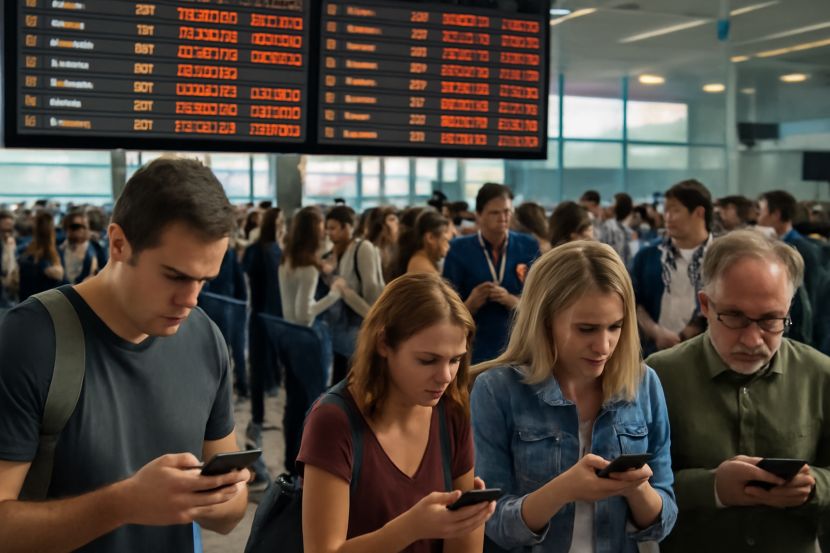Published on
September 26, 2025
On Friday, September 26, 2025, Italy experienced significant disruptions in air travel due to nationwide strikes by airline and airport staff. The 24-hour walkout, organized by unions such as CUB Trasporti and USB, severely impacted major airports including Rome Fiumicino and Milan Malpensa, causing numerous flight cancellations and delays throughout the day. This disruption affected thousands of passengers who were either traveling to, from, or within Italy, highlighting the vulnerability of air travel to labor unrest.
The strikes, which involved a wide range of personnel from airline crews to ground staff, led to significant disruptions across the country’s transport network. The air transport strike has raised concerns about the impact on tourism and business travelers who rely on Italy’s bustling airports for efficient travel. Many flights were delayed for hours, while others were completely canceled, causing inconvenience for passengers heading to popular tourist destinations like Rome, Venice, and Florence.
Scope of the Disruption
The strike involved personnel from various sectors of the air transport industry, including airline crews, baggage handlers, air traffic controllers, and check-in staff. Major airlines operating in Italy, such as Wizz Air and Volotea, were particularly affected. These airlines, known for providing affordable and accessible flights across Europe, experienced significant interruptions in their services, leaving passengers stranded or confused about the status of their flights.
The disruptions were particularly severe at Rome Fiumicino and Milan Malpensa, two of Italy’s busiest airports. The strikes led to overcrowded terminals, long queues, and heightened frustration among travelers, many of whom were unable to obtain updated information about their flights in a timely manner. This left passengers in a state of uncertainty, unable to plan their next steps or book alternative arrangements quickly.
Impact on Major Airports
Rome Fiumicino and Milan Malpensa were the most affected airports. Both are major hubs for international and domestic travel, and the strikes had a ripple effect on tourism in the country. The strikes led to the cancellation of several flights, and check-in processes were delayed for hours, resulting in chaotic scenes at the airport. The disruption at these airports also affected passenger services such as baggage handling, customer support, and flight updates.
In addition to the logistical issues, many passengers were left in limbo as airlines scrambled to rebook flights or find alternative routes. Some travelers reported being left without assistance, causing an already stressful situation to become more frustrating. Hotel bookings, transportation, and itinerary adjustments also became complicated for those whose flights were canceled or delayed for extended periods.
Government Measures and Passenger Rights
In response to the strikes, Italy’s civil aviation authority, ENAC (Ente Nazionale Aviazione Civile), took steps to mitigate the impact on travelers. The authority published a list of guaranteed flights, particularly focusing on intercontinental flights and domestic routes connecting the mainland to the islands of Sicily and Sardinia. These routes were prioritized, and passengers were encouraged to check with their airlines for the latest updates.
ENAC also reminded travelers of their rights during a flight cancellation or delay. According to EU regulations, passengers are entitled to compensation if their flights are delayed by more than three hours or canceled. Additionally, travelers affected by the air transport strike were urged to seek information about rebooking options and alternative flight arrangements from their airlines.
Advice for Affected Travelers
For those traveling in or out of Italy during the strike, several steps can help mitigate the impact:
Check Flight Status Regularly: Passengers should monitor their flight status on their airline’s website or app to stay updated.Contact Airlines Directly: Travelers should reach out to their airlines for the latest information about cancellations or rebookings.Arrive Early: Given the potential for delays in check-in and security procedures, it’s recommended to arrive earlier than usual at the airport.Know Your Rights: Understand passenger rights regarding delayed flights, compensation, and rebooking to ensure that you receive the services you are entitled to under EU law.Looking Ahead: Future of Air Transport in Italy
While the September 26 strikes have concluded, the event highlights ongoing concerns within Italy’s air transport sector. The frequent nature of labor strikes in the country has raised questions about the stability of air travel. Tourism—a major pillar of the Italian economy—is particularly vulnerable to such disruptions. With 2025 being a key year for tourism growth, more attention will need to be given to mitigating these risks and ensuring that airlines, airports, and unions work together to prevent future travel disruptions.
For now, tourists and business travelers are advised to stay informed about potential future strikes and to allow extra time for airport procedures. Those planning travel to Italy in the coming months should be aware of possible disruptions and take the necessary precautions to minimize inconvenience.
The air transport strikes on September 26, 2025, underscored the challenges facing Italy’s tourism sector, with major airports like Rome Fiumicino and Milan Malpensa bearing the brunt of the disruption. As travelers faced delays and cancellations, it was evident that smooth air travel is crucial for both tourism and business in Italy. Going forward, the country’s ability to manage and resolve labor disputes will play a significant role in maintaining its position as one of the world’s top travel destinations. For now, passengers should remain vigilant and prepared, ensuring that they have access to real-time updates and know their rights in case of any future travel disruptions.
